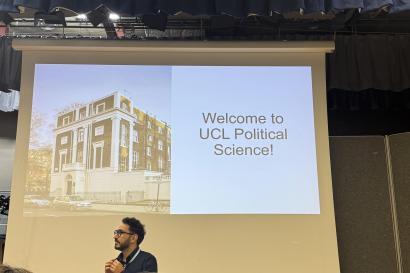Last month, my time as an affiliate student at University College London came to an end, and I thought I would share some of my thoughts on the experience as well as some of the things I noticed as they relate to college in the US. Firstly, I feel so grateful to have had this experience to not only see what school is like in the UK, but also to gain so much knowledge that I truly believe I wouldn’t have gained elsewhere. With that being said, it was still an adjustment at first, with some pretty key differences from my end.
The structure of the classes was similar enough, with lectures every week for each class. However, at my university in the US, we had our discussion sections every week, whereas UCL has them every two weeks, so there’s a total of only four per semester. This ended up being pretty nice though, as it gave me more time to read the assigned novel for the class. In addition, there were also some very small differences that I picked up on too, like how at the end of every lecture, the students applauded for the professor. Or the fact that all of my courses were associated with my major, as opposed to having any gen-eds or electives from other departments. This was a little daunting at first given I had never taken four English classes at the same time before – but ultimately I got used to it.
The major differences though came from the grading system. At my university in the US, your total grade was more cumulative; it was composed of a total of things including attendance, participation, essays or tests, and often some little assignments too. Whereas at UCL, your final grade was composed of only two essays – one written at some point throughout the semester, and the other as a final essay. Honestly, the thing I struggled with the most regarding this system was the fact that these essays could be over quite literally anything we wanted as long as it was associated with literature in the given time period. There was no assigned novel or author or question we had to answer. We also had the choice to write whichever essay we wanted to at any time we wanted to. All we needed to do was email our tutor (more on that later) what day we wanted to meet and what we wanted to write over. There wasn’t even a formal turn-in spot, we just had to email the essay sometime the day before.
This all sounds very nice, but it made me realize how used to the US system I was. I was certainly more accustomed to more rigid deadlines and assignments with less stakes and writing based on specific essay topics. Specifically when it came to the freedom of the topics, I didn’t really know what to make of it at first, and it definitely took some time before I fully realized what it was they were looking for with these essays. Ultimately though, I think I got a better hand on it by the end, and I do feel like I grew a lot when it came to how to formulate essays completely from scratch. It’s also worth mentioning, I think, that the actual percentage numbers differ from the US as well, so instead of an A being around 94-100%, it’s a 70% or above. And a B can be anywhere from 50-69%. That doesn’t mean it’s a lower level or quality of work, but the scale is just different.
One last thing I wanted to mention was something that UCL uses called the “tutorial system.” From my understanding, not every university in the UK uses this system, but essentially what it is is a series of one-on-one meetings that you have with your assigned “tutor” (a professor at the university) in which you discuss the essays you write. You’ll send them about one essay every two weeks or so, and so you meet with them that many times as well. This was honestly pretty nerve-wracking at first. Your tutor is the one who grades your essay, and at your meetings, they will discuss critiques and what you could do better on, as well as ask you questions about the reading and your essay and such. It’s definitely unusual coming from the US, where you’ll often have an essay graded without ever really having a conversation about it or why you got the grade you did. For me, I didn’t really like this system at first, but over time it did become easier as I started to know what to expect. I also gained a lot of perspective about how valuable this system really is. The fact you get to have a conversation about your work with someone who knows the topic quite well really is an amazing opportunity and one that not a lot of colleges provide. By the end of the meetings, I found myself very grateful to have gotten to experience them.
Overall, I definitely felt a more hands-off nature to school in the UK (or UCL at least). They trusted that everyone there was there to learn and didn’t need materialized proof of this fact every class. At the same time, I also feel like I’m someone who really thrives on the structure given by schools in the US. I think at the end of the day, everyone is so different when it comes to how they learn best, and everyone is accustomed to different things. I definitely can’t say for certain which one I like better because there are things I like and don’t like about both. But what matters most in the end is getting to experience something different and getting to learn how to adjust to new systems and new environments. And once again, I’m so grateful I got the opportunity to do just that.
Gabriella Risk
Hi, I'm Gabby! I'm currently studying English & Creative Writing at the University of Iowa. I love reading, writing, and playing tennis. I've dreamed of living in London for as long as I can remember and can't wait to start the adventure this spring!






